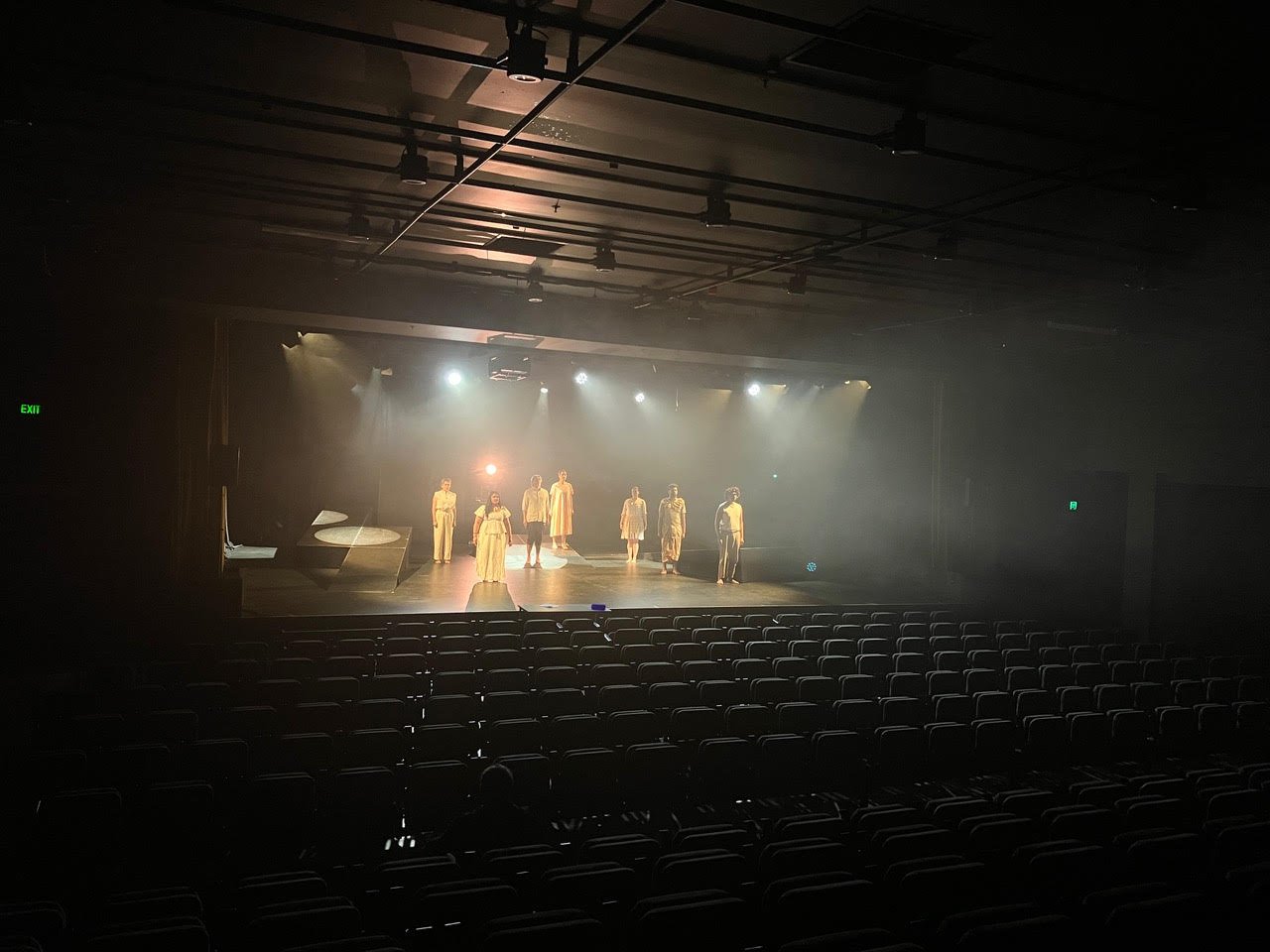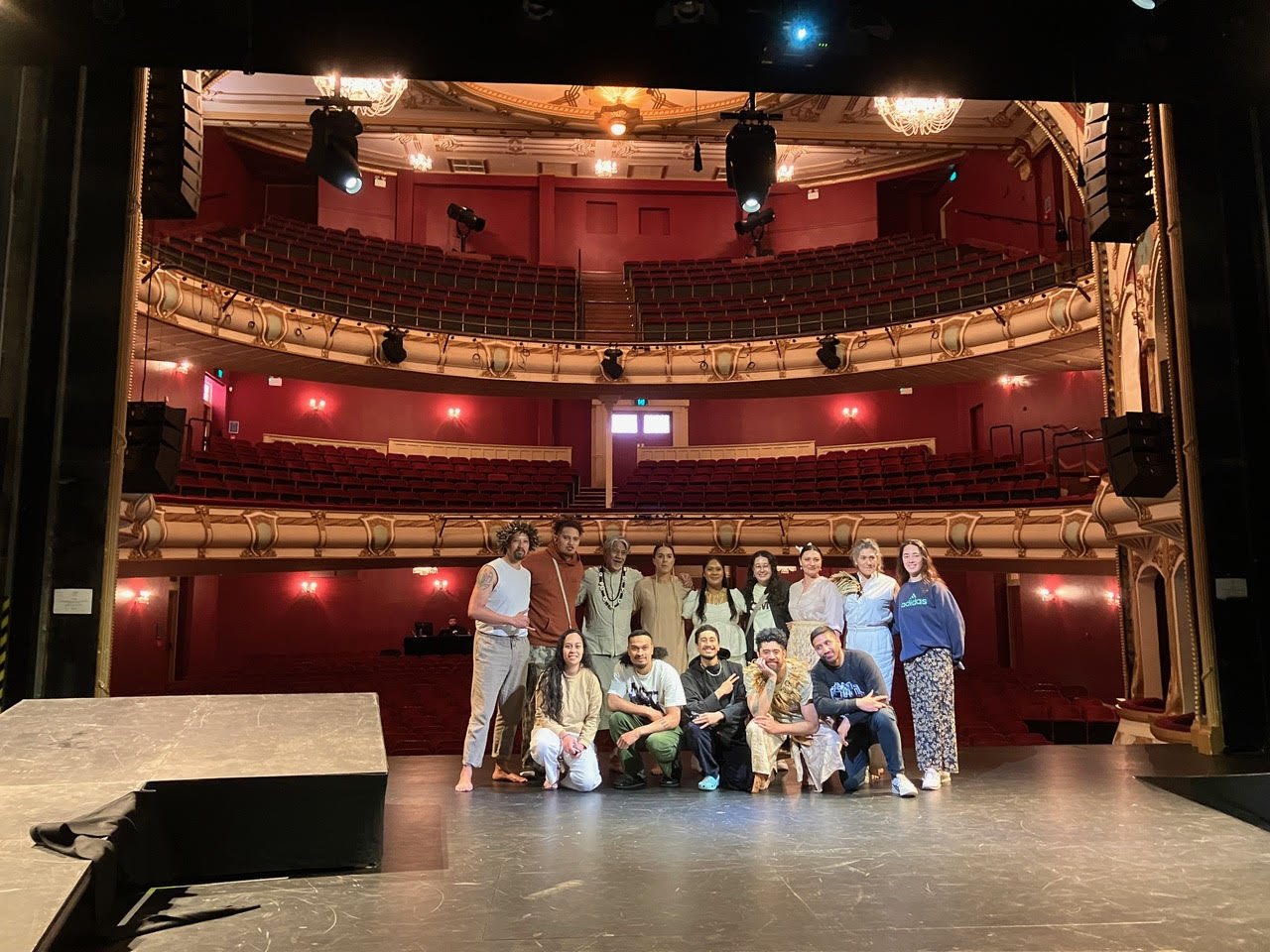Tracking your footprint on the road
My Experience on the UPU tour, October 2023, Andrew Malmo, Tour Producer for PANNZ.
“Great idea... but good luck with that!”
So says most every person I’ve spoken to about the Green Theatre Touring Guide work we undertook on the UPU tour of the North Island in the spring of 2023, summing up a general industry feeling that the idea is kind of impossible – how can we make theatre making, and touring specifically, sustainable? It does seem an insurmountable problem – from the MDF sets we build and throw into landfill, to the thousands of metres of gaffer tape and plastic electrical tape, synthetic costumes often never worn again, props made from expanding foam, latex and polystyrene, and sprayed with solvent and resin-based aerosol paints; from casts and crews flying up and down the country while freight travels in diesel trucks over hundreds of kilometres to the hotel stays, rubbish creation, single-use plastic water bottles, green room food wastage, ground transport… The problem of sustainability in this industry is, quite simply, huge. Where do we even begin? How do we effect real change, and how can we adapt our industry practices and still deliver world-class theatre to diverse audiences in all regions of the country?
Upu at Theatre Royal, New Plymouth. Photo Credit: Andrew Malmo
One of the great discoveries of the green data collection work I did on the UPU tour was the attitude of all the people I engaged with. Everyone was enthusiastic about the idea of sustainability in our industry. From venue managers and technicians, to actors and director – all wanted to engage with the project in a positive way. The seed was sown that we start the process of creating and touring work more sustainably by taking that first step. Just by starting, we become conscious of sustainability in our project, and can analyze everything that we do and create to make whatever large or small changes we can. Immediate starters can be elimination of single use water bottles in green rooms for example, replaced with reusable aluminium drink bottles, and redirecting food waste to compost and away from landfill. Thinking further, we can look to construct sets using renewable, environmentally friendly materials rather than chemical laden MDF, and props and costumes from natural materials that can also be reused or upcycled. We can imagine a future with no electrical tape, or biodegradable gaffer tape (no one is making this yet, but Le Mark are making an environmentally friendlier gaffer tape with recyclable packaging).
Upu Rehearsal, Photo Credit: Andrew Malmo
Ahead of the tour I approached the venue managers to request access to their data and to warn them I’d be rifling through garbage and recycling! All the managers were more than enthusiastic to help as much as they could, and passed me on to the technical management team to coordinate the data collection on the ground.
On the road I was thrilled to see the venues that separated waste into recyclable, compostable and landfill. Accessing power readings was never an issue, and venue management were keen to be updated on the results of the program. The show cast and crew were eager to help by doing their part with waste going into the right places. At venues which did not offer composting we took our compost with us and either someone in the tour party took it home to compost, or we composted at the next venue that did. It was surprising just how much waste was generated, much of it food packaging. Some of the company had reusable keep cup coffee cups and made good use of them; most had reusable drink bottles.
Upu Rehearsal, Photo Credit: Andrew Malmo
My biggest concern with the tour was that the dates did not line up from festival to festival, or venue to venue. This meant there were a couple of trips home for everyone for days off between centres and increased the number of flights. Ideally you would tour from one centre to the next, but with multiple off-days between centres it was much cheaper to fly the company home than pay for rooms and per diems, and allowed company members to see family on the off-days, rather than be away for the full 4 weeks. Some of the company chose to fly to avoid the long road trip home, which was fair enough but added to the flight count. The number of flights and hotel nights add up fast for a tour of this scale with a touring party of up to thirteen people to five centres.
When lighting, AV and sound designs did not align with venue inventory, technical equipment had to be freighted into many of the venues over great distance from either Wellington or Auckland. Many of the hotels we stayed at offered no recycling or composting options, with just one bin for all waste. Things like these might be out of your hands as a touring company, but by flagging them as concerns to venues and accommodation providers, it might be possible to affect change for the future.
Upu at Toi Toi Hawkes Bay Opera House, Photo Credit: Andrew Malmo
Where do we go from here? If theatre making and touring is going to become more sustainable, we need to change how we do things. Can we as an industry put sustainability at the centre, an objective that requires a commitment of time and money, when historically productions are always under time and financial pressure? My experience on the UPU tour suggests the enthusiasm is there. We just need to take the first step.
Andrew Malmo is a production manager and producer in the New Zealand theatre industry, working professionally since 1997, and having a freelance career (on and off) from 2004. He is currently a producer for PANNZ Tour Makers based in Auckland.
He’s worked for New Zealand Opera, Q Theatre, Silo Theatre, Auckland Theatre Company, New Zealand Dance Company, Auckland Arts Festival, PANNZ/Tour Makers, The University of Auckland and many independent theatre companies and makers. Roles have included project manager, lighting designer, production manager, tour manager, producer, programme manager, technician, guest lecturer and photographer.
From 2014 to 2017 Andrew had a key role at Auckland Theatre Company as the ‘Client Representative’ overseeing the build and managing ATC into the new state-of-the-art 668 seat ASB Waterfront Theatre.
Andrew took a couple of years out from the industry 2021-2023 to study at The University of Auckland completing a BA in Art History and Anthropology. He is also a keen photographer and has photographed many theatre shows, as well as loads of travels!





